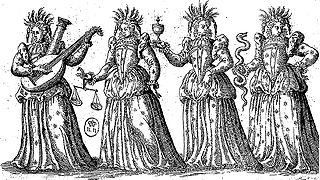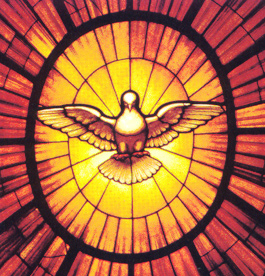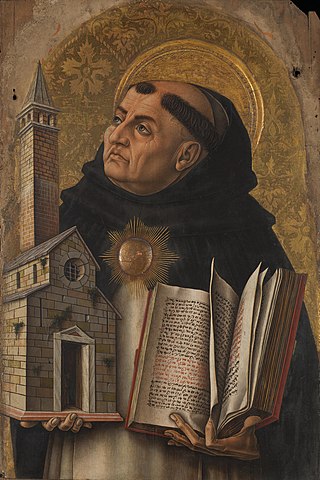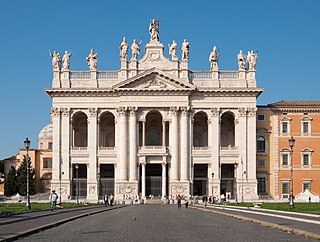Related Research Articles
In Christian theology, traducianism is a doctrine about the origin of the soul holding that this immaterial aspect is transmitted through natural generation along with the body, the material aspect of human beings. That is, human propagation is of the whole being, both material and immaterial aspects: an individual's soul is derived from the soul of one or both parents. This implies that only the soul of Adam was created directly by God, in contrast with the idea of creationism of the soul, which holds that all souls are created directly by God.
Vincent of Lérins was a Gallic monk and author of early Christian writings. One example was the Commonitorium, c. 434, which offers guidance in the orthodox teaching of Christianity. Suspected of semi-Pelagianism, he opposed the Augustinian model of grace and was probably the recipient of Prosper of Aquitaine's Responsiones ad Capitula Objectionum Vincentianarum. His feast day is celebrated on 24 May.

The Book of Judith is a deuterocanonical book included in the Septuagint and the Catholic and Eastern Orthodox Christian Old Testament of the Bible but excluded from the Hebrew canon and assigned by Protestants to the apocrypha. It tells of a Jewish widow, Judith, who uses her beauty and charm to kill an Assyrian general who has besieged her city, Bethulia. With this act, she saves nearby Jerusalem from total destruction. The name Judith, meaning "praised" or "Jewess", is the feminine form of Judah.

Aurelius Prudentius Clemens was a Roman Christian poet, born in the Roman province of Tarraconensis in 348. He probably died in the Iberian Peninsula some time after 405, possibly around 413. The place of his birth is uncertain, but it may have been Caesaraugusta (Saragossa), Tarraco (Tarragona), or Calagurris (Calahorra).

The cardinal virtues are four virtues of mind and character in both classical philosophy and Christian theology. They are prudence, justice, fortitude, and temperance. They form a virtue theory of ethics. The term cardinal comes from the Latin cardo (hinge); these four virtues are called “cardinal” because all other virtues fall under them and hinge upon them.
In Christian tradition, the seven heavenly virtues combine the four cardinal virtues of prudence, justice, temperance, and fortitude with the three theological virtues of faith, hope, and charity.

The seven gifts of the Holy Spirit are an enumeration of seven spiritual gifts first found in the book of Isaiah, and much commented upon by patristic authors. They are: wisdom, understanding, counsel, fortitude, knowledge, piety, and fear of the Lord.
The rule of faith is the name given to the ultimate authority or standard in religious belief. It was used by Early Christian writers such as Tertullian. The phrase is sometimes used for early creeds.
Summa and its diminutive summula was a medieval didactics literary genre written in Latin, born during the 12th century, and popularized in 13th century Europe. In its simplest sense, they might be considered texts that 'sum up' knowledge in a field, such as the compendiums of theology, philosophy and canon law. Their function during the Middle Ages was largely as manuals or handbooks of necessary knowledge used by individuals who would not advance their studies any further.

The name Early African Church is given to the Christian communities inhabiting the region known politically as Roman Africa, and comprised geographically somewhat around the area of the Roman Diocese of Africa, namely: the Mediterranean littoral between Cyrenaica on the east and the river Ampsaga on the west; that part of it that faces the Atlantic Ocean being called Mauretania, in addition to Byzacena. Thus corresponding somewhat to contemporary Morocco, Algeria, Tunisia and Libya. The evangelization of Africa followed much the same lines as those traced by Roman civilization. From the late fifth and early sixth century, the region included several Christian Berber kingdoms.

Christian literature is the literary aspect of Christian media, and it constitutes a huge body of extremely varied writing.

The term Hexameron refers either to the genre of theological treatise that describes God's work on the six days of creation or to the six days of creation themselves. Most often these theological works take the form of commentaries on Genesis. As a genre, hexameral literature was popular in the early church and medieval periods. The word derives its name from the Greek roots hexa-, meaning "six", and hemer-, meaning "day".

Jovinianism refers to an anti-ascetic movement that has its origins in the 4th-century theologian Jovinian, who criticized the monastic movement and argued for the equality of marriage and celibacy. Jovinianism was criticized by Saint Augustine and Jerome.
Catholic dogmatic theology can be defined as "a special branch of theology, the object of which is to present a scientific and connected view of the accepted doctrines of the Christian faith."
Christian views on the classics have varied throughout history. In the early years of Christianity, the writings of Classical and Hellenistic authors were widely spread by Christian teachers. However, during the Dark Ages, the decline in the study of this literature as a whole, as well as the waning of Christianity's popularity throughout Europe, resulted in the extinction of its effect in Christian life until the spread of Islam—the reintroduction of Classical texts—and the "rebirth" of Ancient Greek and Roman philosophies and arts during the Renaissance, where "artists and philosophers, each in their own way, combined Christian belief and ancient philosophy into a balanced, rational, humanistic system". Today, churches' views are generally consistent with those of Renaissance humanists' in that "Christians should be able to read the classics ... because it is part of the Western heritage ... [and] because it is part of Christianity’s inheritance."

Thomas Aquinas was an Italian Dominican friar and priest, an influential philosopher and theologian, and a jurist in the tradition of scholasticism from the county of Aquino in the Kingdom of Sicily, Italy. Thomas was a prominent proponent of natural theology and the father of a school of thought known as Thomism. He argued that God is the source of the light of natural reason and the light of faith. He has been described as "the most influential thinker of the medieval period" and "the greatest of the medieval philosopher-theologians". His ideas, unlike many currents in the Catholic Church of the time, embraced several ideas put forward by Aristotle—whom he called "the Philosopher"—and attempted to synthesize Aristotelian philosophy with the principles of Christianity. He is known in Catholic theology as the Doctor Angelicus, and the Doctor Communis. In 1999, John Paul II added a new title to these traditional ones: Doctor Humanitatis.
Jacob Masen was a German Jesuit priest, historian, dramatist and theologian. He is known as a prolific writer in Latin.

The Latin Church is the largest autonomous particular church within the Catholic Church, whose members constitute the vast majority of the 1.3 billion Christians in communion with the Pope in Rome. The Latin Church is one of 24 churches sui iuris in communion with the pope; the other 23 are collectively referred to as the Eastern Catholic Churches, and have approximately 18 million members combined.

The Church Fathers, Early Church Fathers, Christian Fathers, or Fathers of the Church were ancient and influential Christian theologians and writers who established the intellectual and doctrinal foundations of Christianity. The historical period in which they worked became known as the Patristic Era and spans approximately from the late 1st to mid-8th centuries, flourishing in particular during the 4th and 5th centuries, when Christianity was in the process of establishing itself as the state church of the Roman Empire.
Vigilius of Thapsus also known as Vigilius Tapsensis, Vigilius Afer, or Vergil of Tapso, was a 5th-century Bishop of Thapsus in the province Byzacium, in what is now Tunisia, and as well as a theological writer and polemicist.
References
- ↑ Cambridge University Press, “The beginnings of Latin Christian literature” by Ronald Heine (2008)
- ↑ Herbermann, Charles, ed. (1913). . Catholic Encyclopedia . New York: Robert Appleton Company.
- ↑ EWTN website (Global Catholic Network
- ↑ New Advent website
- ↑ Herbermann, Charles, ed. (1913). . Catholic Encyclopedia . New York: Robert Appleton Company.
- ↑ Ross, James F. 2003. "Thomas Aquinas, 'Summa theologiae' (ca. 1273), Christian Wisdom Explained Philosophically." P. 165 in The Classics of Western Philosophy: A Reader's Guide, edited by J. J. E. Gracia, G. M. Reichberg, B. N. Schumacher. Oxford: Blackwell Publishing. ISBN 9780631236115.